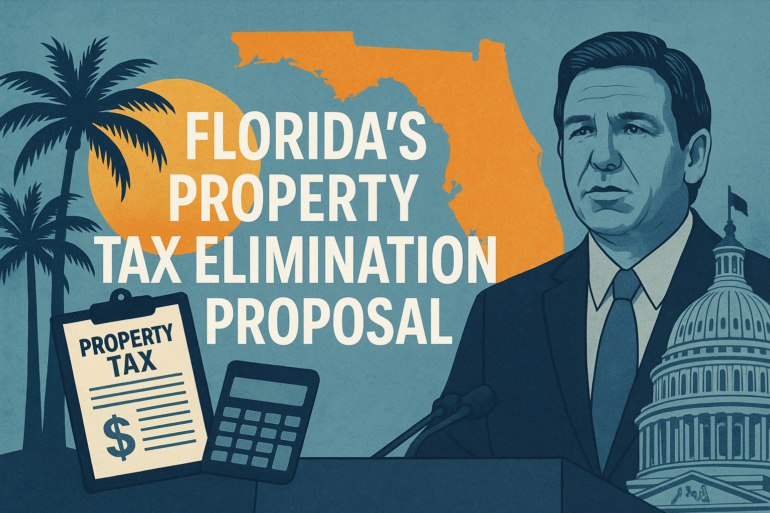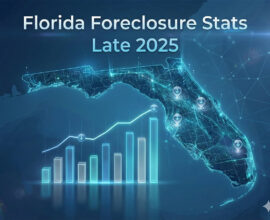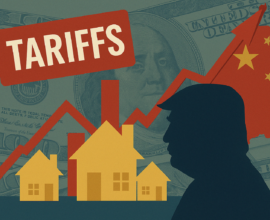The End of Property Taxes in Florida? Here’s What You Need to Know
Florida’s Property Tax Elimination Proposal: Introduction and Overview
In March 2025, during his annual State of the State address, Florida Governor Ron DeSantis proposed one of the most dramatic overhauls to state tax policy in modern U.S. history: the complete elimination of property taxes in Florida. Framing the idea as a defense of private property rights, DeSantis argued that forcing homeowners to pay property taxes indefinitely is akin to “renting from the government,” even after a mortgage is paid off.
The proposal immediately captured public attention and ignited heated debate. At its core, the plan challenges a foundational element of Florida’s fiscal framework. Property taxes currently generate between $50 billion and $55 billion annually, funding critical services such as public education, emergency services, infrastructure, and law enforcement across the state. The potential removal of this revenue source raises serious concerns among economists, local officials, and lawmakers.
Critics warn that eliminating such a vital funding mechanism—without implementing a state income tax, which the governor has firmly ruled out—could destabilize public services statewide. Others question whether the proposed change is politically or financially feasible, especially without a detailed replacement strategy in place.
Supporters of the initiative see it as an overdue correction to what they view as a broken system. They argue that abolishing property taxes would protect homeowners, encourage investment, and support long-term affordability in a state facing rapid population growth and rising housing costs.
The announcement has set off a wave of policy proposals, legislative countermeasures, and stakeholder responses that will shape Florida’s tax landscape for years to come. As the debate unfolds, it raises a central question: Can Florida provide tax relief without sacrificing daily essential services its communities rely on?
Details of the Property Tax Elimination Plan
The Broad Scope of the Initial Proposal
Governor DeSantis’s initial announcement outlined a sweeping and ambitious plan: the complete elimination of property taxes across the state of Florida. His proposal included not just taxes on residential homes but also levies on rental properties, commercial real estate, and even tangible personal property such as business equipment and machinery. This all-encompassing approach underscored the initiative’s boldness and highlighted the enormous fiscal challenges it presented.
At the time of the announcement, property taxes were generating approximately $50 to $55 billion per year. Of this, around $33.7 billion supported county and municipal governments, helping to fund essential public services such as law enforcement, fire departments, and local infrastructure projects. An additional $21.5 billion went directly to public education across the state. Removing this revenue stream without offering a clearly defined replacement mechanism triggered alarm among fiscal analysts, economists, and local government leaders.
Critics argued that the loss of such a significant and stable source of income could lead to underfunded schools, delayed infrastructure repairs, and diminished emergency services. The proposal also sparked concern among conservative lawmakers, who feared that the state could eventually be forced to implement a personal income tax or make drastic cuts to core services.
The $5 Billion Rebate: A Short-Term Adjustment
Within weeks of the initial announcement, the backlash from legislators, watchdog groups, and local officials prompted Governor DeSantis to revise his approach. In late March 2025, he introduced a more targeted, short-term plan designed to provide immediate relief to Florida homeowners. This revised proposal called for a $5 billion reduction in property taxes, focused exclusively on homesteaded primary residences. Under the plan, the average Florida homeowner would receive approximately a $1,000 rebate.
DeSantis proposed tapping into the state’s budget surplus to fund the program, avoiding the need for new taxes in the short term. Framing the revised proposal as an interim measure, the governor characterized it as a step toward eliminating property taxes. He emphasized the need to ease the financial burden on working families facing rising housing costs, insurance premiums, and inflationary pressures.
While the scaled-back plan was met with less resistance than the original proposal, it still drew criticism from both sides of the aisle. Fiscal conservatives warned that using budget surpluses for recurring expenses could lead to structural deficits in the future. Legislative budget committees raised concerns that issuing large-scale rebates might set an unsustainable precedent and complicate future fiscal planning.
Nonetheless, the revised proposal represented a strategic pivot by DeSantis—an attempt to build public and legislative support for the broader initiative by first demonstrating short-term, tangible benefits to homeowners. It also reflected a growing recognition that while eliminating property taxes may be politically appealing, its implementation would require a far more measured and incremental path.
Legislative Responses to the Property Tax Proposal
Senate Bill 7034 and Albritton’s Cautious Approach
In response to Governor DeSantis’s proposal, Florida Senate President Ben Albritton adopted a cautious yet constructive stance. While acknowledging the political appeal of property tax reform, Albritton emphasized the importance of understanding its full implications before making any permanent changes to the state’s tax structure. He underscored the potential consequences of abruptly eliminating a funding source that underpins local governance and public services across the state.
To provide a framework for deeper analysis, Albritton introduced Senate Bill 7034, which proposed the creation of a formal study commission. The purpose of the commission would be to thoroughly examine the economic, fiscal, and societal effects of reducing or eliminating property taxes—particularly in the context of primary residences. The study would aim to assess the broader consequences for public education, municipal services, infrastructure, and property values.
Among its objectives, the commission was tasked with identifying how any resulting funding gaps could be addressed and what behavioral changes might occur among property owners and investors in response to new tax policies. The report, scheduled for release by November 2025, would also help lay the groundwork for a potential constitutional amendment that could appear on the November 2026 statewide ballot.
Albritton’s methodical approach reflects a broader sentiment in the legislature: While there is interest in offering property tax relief, any reform must be backed by rigorous analysis and a feasible replacement plan. His strategy also signals a commitment to building consensus and minimizing fiscal risk as Florida considers such a transformative policy shift.
Alternative Tax Relief Plans from Other Lawmakers
While Albritton focused on research and planning, other legislators put forward alternative policy ideas that varied widely in scope and ambition. These proposals illustrated the diversity of opinion within the legislature on how to reduce the property tax burden without destabilizing local finances.
Senator Blaise Ingoglia, for instance, proposed gradually increasing the homestead exemption. His plan aimed to provide incremental relief to homeowners over time while preserving the essential revenue that local governments rely on. Ingoglia positioned his proposal as a measured alternative that could help residents without triggering large-scale fiscal disruption.
Meanwhile, Representative Ryan Chamberlin introduced House Bill 357, which proposed a universal $100,000 exemption on all property types. This measure would significantly reduce the taxable value of residential, commercial, and investment properties across the board. Chamberlin argued that his bill would provide immediate financial relief for property owners and spur economic growth without completely dismantling the property tax system.
Other lawmakers went in a different direction altogether. Some floated proposals to reduce the state sales tax rather than alter property taxes. Their reasoning was that lowering sales tax would provide relief not just to homeowners but also to renters, businesses, and tourists—broadening the economic benefits while preserving local control of property tax revenues.
Together, these legislative efforts reflect a range of political and policy philosophies. While some lawmakers support Governor DeSantis’s vision of eliminating property taxes, others favor more targeted adjustments or entirely different tax relief mechanisms. What unites these various efforts is a recognition that Florida’s tax system is under pressure—and that any changes must be weighed carefully to avoid unintended consequences.
Reactions from Lawmakers, Experts, and Local Governments
Republican Lawmakers Seek Fiscal Stability
While many Republican lawmakers support the philosophical underpinnings of Governor DeSantis’s plan—particularly its focus on individual property rights and limited government—they have expressed caution regarding its practical implementation. Several members of the GOP have voiced concern about the potential consequences of removing such a substantial and reliable revenue stream without a sustainable alternative.
Senate President Ben Albritton remains one of the most vocal advocates for a measured approach, emphasizing the need for comprehensive research and long-term planning. Other Republican legislators have echoed his sentiment, highlighting the risks of destabilizing public services that are popular even among conservative constituencies, such as law enforcement and public schools.
Key concerns among Republicans include:
- The long-term sustainability of using budget surpluses for recurring tax relief
- Ensuring continued funding for essential services
- Avoiding a forced shift toward a state income tax in the future
In general, the party appears to be navigating a delicate balance—supporting tax relief while avoiding fiscal disruption or unintended political consequences.
Democratic Lawmakers Oppose the Plan
Democratic lawmakers have strongly opposed the governor’s proposal, calling it fiscally reckless and ideologically extreme. Their primary concern is that eliminating property taxes would severely compromise the funding of vital public services, particularly in education, public safety, and health.
House Minority Leader Fentrice Driskell criticized the plan for lacking transparency and detail, especially regarding how the state would compensate for the loss of billions in local revenue. Senator Shevrin Jones further warned that the consequences would fall disproportionately on lower-income and working-class families, particularly if regressive alternatives like increased sales taxes were introduced to fill the gap.
Democratic objections center around:
- Potential cuts to schools, emergency services, and infrastructure
- Regressive tax alternatives (e.g., higher sales tax) that disproportionately affect low-income Floridians
- Loss of local control and the increased politicization of funding decisions at the state level
Overall, Democrats have framed the proposal as a threat to economic fairness and community stability, urging a more equitable and transparent approach to any tax reforms.
What Economists and Analysts Are Saying
Independent policy analysts and economists have added a nonpartisan voice to the debate, often reinforcing the concerns raised by Democratic lawmakers and cautious Republicans. One of the most prominent critiques comes from the Florida Policy Institute (FPI), which issued a detailed report warning that the plan could create significant economic risks for the state.
According to the FPI, replacing property tax revenue with increased sales taxes would require nearly doubling Florida’s current 6% rate—pushing it as high as 12%. This would not only make Florida’s sales tax among the highest in the nation but could also introduce greater revenue volatility, especially during economic downturns when consumer spending typically declines.
Key takeaways from independent analysis:
- A steep sales tax increase would burden low- and middle-income households
- Revenue volatility could destabilize school and emergency funding
- Florida’s economic competitiveness could be hurt, especially in the tourism and retail sectors
Economists broadly agree that while tax reform is possible, it must be structured to avoid disproportionately shifting the burden onto those least able to absorb it.
Local Governments Warn of Funding Risks
Local governments have perhaps the most at stake in the property tax debate, as they rely heavily on this revenue to fund daily operations and community services. Organizations such as the Florida League of Cities and the Florida Association of Counties have spoken out against the governor’s proposal, arguing that it would undermine local financial autonomy and operational stability.
County officials across the state, particularly in urban areas like Miami-Dade and Hillsborough, have expressed alarm about how they would maintain services without a guaranteed revenue base. These governments often tailor their budgets to the specific needs of their populations, and a loss of property tax income could lead to service cuts, layoffs, or increased dependence on state-level appropriations.
Concerns voiced by local governments include:
- Loss of reliable and flexible funding
- Risks to hurricane preparedness, public health, and infrastructure maintenance
- Becoming overly dependent on Tallahassee, potentially politicizing local service delivery
Many local leaders argue that eliminating property taxes would result in a one-size-fits-all funding model ill-suited for Florida’s diverse municipalities. They emphasize the importance of preserving local control and fiscal independence in order to respond effectively to the unique challenges facing each community.
How the Proposal Could Impact Homeowners, Investors, and Businesses
What It Means for Florida Homeowners
For Florida homeowners, eliminating property taxes would offer immediate and noticeable financial relief. Property taxes often represent a significant portion of annual housing costs, especially in high-value markets like Miami, Tampa, and Orlando. Without this recurring obligation, homeowners could see thousands of dollars in annual savings—effectively increasing their disposable income and easing the overall cost of homeownership.
This change could especially benefit:
- First-time buyers, who often struggle with high monthly housing costs
- Fixed-income households, such as retirees, who are sensitive to rising expenses
- Middle-class families, who often pay a disproportionate share of property taxes relative to income
However, economists caution that these savings could be quickly absorbed by market dynamics. With reduced costs of ownership, demand for housing may rise, driving up property prices. Buyers may factor the lack of property taxes into their purchasing power, bidding higher on homes and potentially inflating housing values.
Potential consequences:
- Short-term gains in affordability and equity for existing homeowners
- Rising home prices, possibly pushing out lower-income buyers over time
- Displacement of the tax burden onto other areas like insurance or HOA fees
Overall, while homeowners may enjoy the initial benefits, the long-term impact on housing affordability and community stability remains uncertain.
Impacts on Residential Real Estate Investors
Real estate investors stand to gain significantly from the elimination of property taxes. In rental markets, property taxes often account for a substantial share of operating expenses, sometimes consuming 10–20% of annual rental income. Removing this cost could dramatically improve profit margins, making Florida even more attractive to investors nationwide.
Benefits for investors would likely include:
- Higher net operating income (NOI)
- Increased property valuations based on improved cash flow
- More competitive leverage when acquiring new properties
With fewer overhead costs, investors might also expand portfolios, intensifying competition in the housing market. Over time, this could lead to the development of more rental housing, though potentially at the expense of owner-occupied opportunities.
Still, the influx of investor activity could have side effects:
- Reduced affordability for would-be homeowners
- Market imbalance favoring large investment firms over individual buyers
- Increased pressure on rent control and tenant protections
The long-term effect may be a more investor-dominated housing market, with both benefits and risks for Florida communities.
Commercial Real Estate Gains and Risks
The elimination of property taxes would also benefit commercial real estate owners and tenants—particularly those operating under triple-net leases, where tenants are responsible for covering property tax expenses in addition to rent and maintenance.
Small businesses, which often struggle with narrow profit margins, could see meaningful reductions in their overhead. For landlords, this may create an opportunity to increase occupancy rates or gradually raise rents in high-demand areas.
Commercial stakeholders would benefit from the following:
- Lower operating costs, particularly for small retailers and service businesses
- Higher demand for retail and office space
- Appreciation of commercial property values
However, commercial property owners and tenants also rely heavily on local services funded by property taxes—such as transportation infrastructure, policing, and emergency response. If these services are compromised due to funding shortfalls, the cost savings from tax elimination could be offset by new business risks.
Potential risks include:
- Deterioration of local infrastructure, affecting customer traffic and operations
- Delayed emergency services, impacting liability and insurance costs
- Greater reliance on state-managed funding, reducing local responsiveness
In summary, while commercial stakeholders may enjoy short-term financial gains, their long-term success depends on a stable and well-serviced local environment.
Historical Lessons from Other States
California’s Proposition 13: A Cautionary Tale
One of the most widely cited examples in discussions about property tax reform is California’s Proposition 13, a constitutional amendment passed by voters in 1978. The measure dramatically limited property tax rates and restricted the ability of local governments to reassess property values for tax purposes.
Key elements of Proposition 13 included:
- A tax rate cap of 1% of assessed value
- Annual increases in assessed value limited to 2% per year
- Reassessment of property value only upon sale or new construction
While the measure provided immediate and lasting tax relief for property owners—notably longtime homeowners—it had serious downstream effects on local governments. With property tax revenues dramatically reduced, localities became increasingly dependent on the state government for funding, especially for public education.
Long-term consequences included:
- Decreased local control over budgeting and funding priorities
- Increased reliance on less stable revenue sources like sales and income taxes
- Widening inequalities, as residents with similar homes in the same neighborhood paid vastly different tax rates based on when they bought
Over time, California’s education system, once among the most well-funded in the country, suffered significant declines. The measure also introduced distortions in the housing market, as it discouraged homeowners from moving to avoid triggering a reassessment.
For Florida, the takeaway is clear: abrupt or poorly planned property tax reform can erode service quality, deepen inequity, and weaken local autonomy—even if it delivers political wins in the short term.
Michigan’s Proposal A: Restructuring with Trade-Offs
In contrast to California’s approach, Michigan’s Proposal A, passed in 1994, aimed to restructure education funding more equitably by reducing reliance on local property taxes and shifting the burden to state-level sales tax.
Key components of Proposal A included:
- A reduction in local school district property taxes
- An increase in the state sales tax (from 4% to 6%) to replace lost revenue
- Centralization of school funding at the state level to promote equity
The plan successfully addressed many of the concerns it was designed to address. School districts in poorer areas received more consistent funding, and property owners saw a tangible decrease in tax burdens.
However, Proposal A also had drawbacks:
- Revenue from sales tax proved less stable than property taxes, leading to budget volatility
- Economic downturns created funding gaps that affected school operations
- Some districts still found ways to supplement funding, leading to persistent disparities
Michigan’s example illustrates the importance of clear communication, defined trade-offs, and a sustainable replacement plan. Proposal A succeeded, whereas Proposition 13 stumbled because it accounted for the financial impacts and tried to preserve essential services—even though its long-term effectiveness has been mixed.
Takeaways for Florida’s Property Tax Reform
Florida policymakers considering property tax reform can draw several lessons:
- Gradual change is safer than sweeping, overnight reform
- Alternative revenue sources must be stable, not overly dependent on consumer behavior
- Transparency and clear trade-offs are key to public buy-in
- Protecting education and public services must be prioritized to avoid systemic decline
These historical precedents offer a roadmap of both cautionary tales and best practices, underscoring the need for thoughtful execution if Florida pursues any major overhaul of its tax system.
Feasibility and Funding Alternatives
Can Florida Replace $50 Billion in Revenue?
Eliminating property taxes in Florida would create a substantial funding gap—estimated between $50 billion and $55 billion annually—that must be filled through alternative means. The most frequently discussed option is increasing the state sales tax, currently set at 6%.
According to fiscal analysts, replacing lost property tax revenue with sales tax alone would require nearly doubling the current rate to around 12%. This would give Florida one of the highest sales tax rates in the United States and could have major ripple effects on consumer behavior and tourism.
Risks of a sales tax increase include:
- Reduced consumer spending, particularly among low- and middle-income residents
- Diminished tourism appeal, as higher costs deter out-of-state visitors
- Revenue volatility, especially during economic downturns when spending drops
In response, several alternative or supplementary revenue sources have been proposed:
- Luxury taxes on high-end goods and services
- Tourism-related surcharges (e.g., on hotel stays, rental cars, theme parks)
- Corporate income tax reforms, including higher rates or closing loopholes
- Reinstating the intangible tax on assets like stocks, bonds, and mutual funds
- Increased documentary stamp taxes on high-value real estate transactions
Each of these options carries its own political and economic trade-offs. While more progressive in structure than a broad sales tax hike, they are also more complex to administer and may face strong opposition from business groups and high-net-worth individuals.
A sustainable replacement strategy would likely require a mix of multiple tools rather than relying on a single solution. Spreading the fiscal burden more broadly could protect Florida’s economic competitiveness while ensuring essential services remain funded.
The Challenges of Cutting State Spending
Governor DeSantis and his supporters have floated the idea that expenditure reductions could help close the funding gap left by property tax elimination. Florida’s recent budget surpluses are cited as evidence that the state can absorb some cuts without sacrificing service quality.
Arguments in favor of spending cuts include:
- A belief that Florida’s government contains waste and inefficiencies
- Confidence in economic growth to naturally increase other revenue streams
- The idea that trimming budgets could promote leaner, more efficient governance
However, critics warn that such optimism may be misplaced. Budget surpluses can be cyclical and unreliable, especially in the event of a recession or natural disaster. Relying on temporary surpluses to fund permanent obligations is viewed by many economists as fiscally irresponsible.
To fully offset the loss of property tax revenue through spending cuts alone, the state would need to make severe reductions in areas such as:
- Public Education
- Emergency response and law enforcement
- Transportation infrastructure
- Public health programs and social services
Such cuts could quickly erode quality of life, reduce economic stability, and jeopardize Florida’s ability to attract new residents and businesses.
Challenges of a cuts-only approach:
- Cuts would need to total tens of billions of dollars annually
- Essential services could be severely impacted
- Public and political backlash would be likely
A more realistic path may involve a blended strategy: modest spending cuts, incremental tax adjustments, and targeted revenue-generation tools. This would allow Florida to reduce tax burdens responsibly without destabilizing its core functions.
Conclusion: The Future of Florida’s Tax System
Governor Ron DeSantis’s proposal to eliminate property taxes in Florida has sparked one of the most consequential policy debates in the state’s modern history. While the idea resonates with many homeowners and real estate investors eager for tax relief, the financial, political, and social implications are profound.
Eliminating property taxes would offer clear short-term benefits, including increased disposable income for homeowners, greater profitability for investors, and a strong signal of the state’s pro-property-rights stance. However, the proposal also presents serious long-term challenges that cannot be ignored. Property taxes currently serve as the foundation for funding Florida’s public education system, emergency services, infrastructure, and essential local government operations.
Replacing this revenue without implementing a state income tax—a policy DeSantis has repeatedly opposed—would require bold alternatives, such as a sharp increase in the sales tax or deep spending cuts. Both options carry significant risks: increased cost burdens for low-income residents, volatility in government funding, and a decline in service quality that could hurt Florida’s reputation as a destination for families, retirees, and businesses alike.
The range of responses from lawmakers, local officials, economists, and advocacy groups highlights the complexity of the issue. While some push for incremental reforms, such as increasing the homestead exemption or studying long-term strategies, others reject the idea outright due to concerns about economic inequality and fiscal sustainability.
Historical precedents like California’s Proposition 13 and Michigan’s Proposal A underscore the importance of careful planning, transparency, and clearly defined trade-offs when pursuing tax reform. These examples show that while reform can succeed under the right conditions, it can also lead to unintended consequences if implemented too quickly or without a stable funding plan.
As Florida lawmakers prepare for the 2026 ballot and continue deliberations, the question is no longer just whether property taxes should be eliminated—but how to protect public services, ensure fairness, and preserve local control in any transition that follows. The outcome of this debate could shape the future of Florida’s fiscal model for decades and influence national conversations on property rights and tax policy.
In the end, Florida’s path forward must strike a delicate balance between taxpayer relief and responsible governance. Whether it becomes a bold model for the nation or a cautionary tale will depend entirely on how thoughtfully—and transparently—this unprecedented reform is approached.








